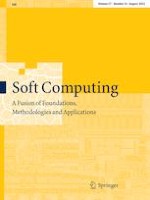10.05.2023 | Optimization
Differential evolution improvement by adaptive ranking-based constraint handling technique
Erschienen in: Soft Computing | Ausgabe 16/2023
EinloggenAktivieren Sie unsere intelligente Suche, um passende Fachinhalte oder Patente zu finden.
Wählen Sie Textabschnitte aus um mit Künstlicher Intelligenz passenden Patente zu finden. powered by
Markieren Sie Textabschnitte, um KI-gestützt weitere passende Inhalte zu finden. powered by
